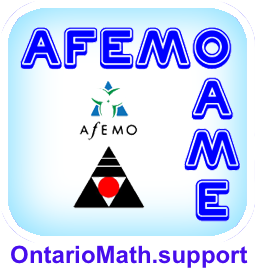President's Message - December 2016
Growth Mindset At Leadership 2016

JUDY MENDAGLIO
judy.mendaglio@oame.on.ca
There seems to be an awful lot of activity around mathematics education in this province. I know that many of you have been searching through the data that was released by EQAO at the start of the year, identifying challenges and next steps for your own schools. Many of you have also been involved in Renewed Math Strategy meetings and workshops, developing implementation strategies for your boards and schools. Perhaps you are sharing what you learned at this summer's Grade 9 Applied Institutes in your schools. Those of you who were at the 2016 Leadership Conference may be implementing some of the strategies you learned from Jo Boaler. Many of you will be planning for your trip to Kingston in May, to attend the OAME 2017 Annual Conference. Perhaps you are waiting to hear if your proposal has been accepted. It is a busy time across the province.
In the last message, I mentioned that I enjoy reading about mathematics, and I shared an "aha" moment I had while reading Ian Hacking's Why Is There Philosophy of Mathematics At All?. Knowing that I will find these tidbits of wonderful ideas about how to better engage students with math in every book is one of the reasons I read them. To be clear, I am not alone in enjoying these books. In fact, I have many colleagues and friends who borrow my books, or lend me theirs, so that we can share these ideas together. I have lent so many books that have never been returned that a friend bought me this fridge magnet.
So what have I been reading lately? I have abandoned my own bedside stack of books, and have been mining the local library. A friend whose judgment I value recommended that I read Dataclysm: Who We Are (When We Think No One's Looking), by Christian Rudder. Rudder is a Harvard University mathematics graduate who went on to found dating site OKCupid. OKCupid was sold to Match.com for $50 million dollars in 2011. (And to think that I was told that mathematicians never get rich!)
Rudder has gathered an amazing array of findings about our behaviour, using vast amounts of personal data mined from Google, Facebook, Twitter, and the millions of people who use OkCupid. What makes the book especially interesting is that this data did not come from a census or a survey. Rather, it is data that captures and describes the patterns in our personal lives.
I can't help but believe that within the pages of this book are many really good answers to the most popular mathstudent question ever: "Why are we learning this anyway?"
My teacher-eye was also intrigued by this passage from Dataclysm: "Numbers are tricky. Even without context, they give the appearance of fact, and their specificity forbids argument... But behind every number, there's a person making decisions: what to analyze, what to exclude,...." These statements made me think about an article I read long ago that has always stayed with me - The Myth of Objectivity in Mathematics Assessment, written by Lew Romagnano and published in 2001, long before Growing Success was released in Ontario in 2010. To me, Rudder's remarks remind me of the ongoing struggle between qualitative and quantitative data, between what is valid data and what is reliable data. Romagnano's argument that all assessments of students' mathematical understanding are subjective had me immediately reevaluating my own assessment and evaluation practices. In the years since, I have become even more convinced that Romagnano was correct. EQAO was still new to us, and many of us went to "moderated marking" sessions. Participating in these sessions provided more opportunity for me to understand my own beliefs about the "objectivity" of math assessment in a new way: at each table, we were given explicit instructions about the purpose of each question (what was being assessed), and we were given very clear mark allocation instructions. Yet, as individual, well-experienced teachers, we came up with very different marks for the same work.
I hope that you have a great start to the new year and that 2017 is math-ful for you!
Previous Message:
2016 President Message: Judy Mendaglio
Next Message:
Spring Into Something Completely Different


















 Like us on FaceBook
Like us on FaceBook